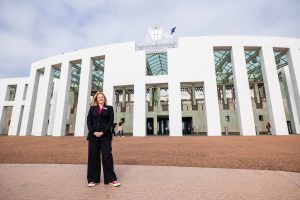When you live with family violence, you become attuned to the signs that things are about to take a turn for the worse.
Many women and children have learned to dread the sound of an alcohol delivery driver pulling up outside their home, knowing it will trigger an escalation from safety planning to panic stations.
Alcohol doesn’t cause violence, but it does exacerbate it. When the accessibility of alcohol increases, so does violence.
As we look for ways to address Australia’s epidemic of domestic and family violence, we need to acknowledge the role of alcohol. And we now have a model to follow – one that is evidence-based and backed by the community.
In December, the South Australian Government proposed changes to their state’s alcohol laws, which family violence survivor advocates, like me, have been calling on for decades.
They include keeping alcohol delivery to between 10am and 10pm, and introducing a two-hour safety pause between ordering alcohol and it being delivered. The changes would also ensure harm minimisation is the key consideration when drafting laws around the way alcohol is sold, delivered and marketed.
These modest, common sense measures have widespread public support and if the Malinauskas Government introduces its current draft Bill to parliament as is, it will have a measurable impact on preventing and reducing rates of family and domestic violence. It’s the kind of public policy that can literally save lives.
South Australia is leading the way by putting the health of their community first, and we must seize the momentum and ensure these laws are replicated nationwide.
We owe it to the thousands of women and children who aren’t safe in their homes tonight but would sleep easier knowing these simple measures are in place.
We know that reducing availability works to reduce harm. In 2016, the NSW Government extended alcohol takeaway and delivery sales by one hour from a 10pm to 11pm close. It led to a significant increase in family violence. In 38 months, the state recorded more than 1,100 additional assaults.
The majority of family and domestic violence occurs in the home, late at night. Alcohol-related assaults increase substantially between 6pm and 3am, with 37 per cent of these assaults occurring in the home and 57 per cent of those being family violence.
Victim survivors know that the link is unequivocal between alcohol and the violence we experience. Our real-life experiences are testament to that, and they can’t be ignored.
Policy makers also need to listen to our children, whose voices are often missing from this conversation but are often the most affected.
Research shows one in six children have experienced harm from the alcohol use of adults around them – two-thirds of it attributed to an adult in their home.
Children hiding under beds, in closets and bathrooms, hearing furniture thrown, glass shattering, yelling and screaming. These children living in fear in their own homes tonight deserve a sense of urgency. They need community leaders to pull every possible lever– because their lives literally depend on it.
Alcohol’s role in family violence is no longer up for debate. Last August, Australia’s Domestic, Family and Sexual Violence Commissioner, Micaela Cronin said alcohol, must be part of the approach to prevent gendered violence.
The Federal Government appointed an expert panel on preventing domestic, family and sexual violence. They called for action on alcohol with several strong recommendations including reducing alcohol delivery timeframes and advertising.
Following the National Cabinet in September, Prime Minister Anthony Albanese acknowledged alcohol’s role in violence, and every state and territory leader agreed to review their alcohol laws.
I am deeply grateful that our nation’s leaders have finally acknowledged alcohol’s role, but what we need now is meaningful action to address it.
The South Australian Government is showing us what’s possible.
I thank Premier Peter Malinauskas and Minister for Consumer and Business Affairs, Andrea Michaels for their leadership, and for prioritising the safety and wellbeing of victim survivors and our children.
I implore every state and territory to follow their lead with laws that keep victim-survivors safe. It will not only prevent and reduce the severity of violence – it will save lives.
Kym Valentine is an actor, Survivor Advocate and Lived Experience Advisor at FARE.
If you or someone you know needs support, please call Lifeline 13 11 14, 1800 Respect 1800 737 732 or National 24/7 Alcohol and Other Drugs Hotline 1800 250 015







